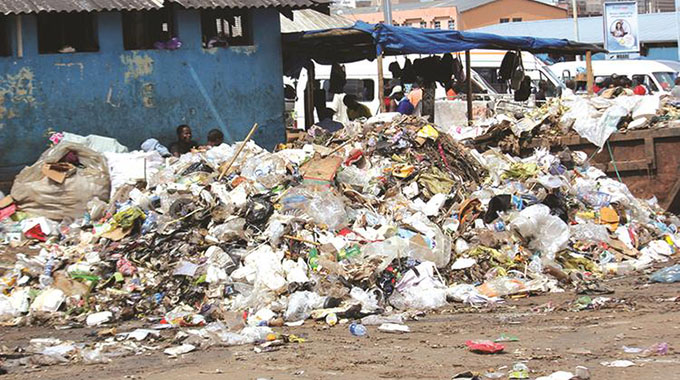Editorial Comment: Garbage, storm drains: Not just council fails

Harare is heading for a meltdown with the combination of uncollected garbage, heavy rain and clogged storm drains and playing blame games is not going to help.
It needs a concentrated effort by everyone to prevent a public health disaster built around diarrhoeal diseases to add to the pain we are suffering from Covid-19.
Council says it cannot collect rubbish because it has no fuel for its trucks because Zimra emptied its bank accounts. The fact that Zimra was taking the PAYE council had been deducting from salaries of its employees each month, but neglecting to send to Zimra does not make Zimra evil.
The money was never the city council’s: it is the taxes that its employees have to pay and did pay. Council was expected to be the agent so its staff could fulfil their legal obligations to pay income tax.
But having got itself into this mess, the council now needs to take action, for a start asking residents to pay their rates, which is not easy since trying to find out how much you owe the council is a difficult task in itself.
And in the middle of a level four lockdown a lot of residents have seen their income cut, or even eliminated, so cash for the council is not the highest priority.
But there is a swathe of ratepayers who are earning money and who can be asked to pay at least what they owe, and a return to an interesting scheme council once had of a discount for those who keep a positive balance with the council could help ease cash flows.
At the very least, the attempt should be made. Even an appeal for everyone to pay something would help.
Even approaching the Ministry of Local Government and Public Works should be tried. The provincial development co-ordinator is an activist in what must be an extraordinary difficult job with a lot of innovative ideas and a focus on getting the councils in his province to work properly rather than score political points.
And getting the garbage trucks on the street is a central priority of any council. Perhaps he has ideas; perhaps some sort of arrangement for the council to borrow fuel purely for the trucks against a secure flow of income could be made.
The second problem, of blocked drains and residents dumping garbage on open land, which tends to be the wetlands, is something that is very largely not the council’s fault, but the council will have to coordinate the health response when the wave of non-Covid diseases strike.
So it might as well start coordinating the response now before the diseases.
Storm water drains get clogged with litter in areas where they run underground, mainly the old central part of the city and the ring of inner and industrial suburbs.
To give council its due, it did open the catch pits and extract the filth before the rains started, but they quickly filled up again. And some steal the gratings that are supposed to trap the litter above the surface.
The drains were designed to be self-cleaning, but regrettably in the days when very few bought take-aways and plastic bottles of drinks, everything from water to opaque beer, consumed these as they walked or sat around in public and hurled the litter down a convenient catch pit if they were tidy or into the gutter if they were not.
The fact that council has never exercised its powers and called in police to enforce by-laws, or even tried to have some municipal guards converted into inspectors is an omission.
But a renewed effort is now needed.
Outside the inner ring of suburbs the storm water drains are on the surface, running along the side of the road. Most are in appalling condition and some no longer exist. In newer housing areas they were often never dug in the first place.
While most householders do cut the grass on their verges, and some go to great lengths to do a bit of landscaping to make their entrance appealing, few remember that it rains. So you get drains silted up and sometimes deliberately filled in to make a lawn verge.
The result is that as we get these storms and spells of heavy rain, the roads become the drains, making potholes even worse, and those on the lower side of each road face flooding.
The near universal erection of walls can channel those floods, but gates provide an opening. On every street one side of the road is lower than the level of the street, so half the properties are at risk of draining the road.
Here a concerted campaign to get householders, factory owners and other property owners to fix the short stretch of drain running past their property would help.
It just needs some digging and clearing out the muck in the culvert pipe running under the entrance. That is not that difficult, once a drain has been properly dug, since the pipe is exposed and a hole can be punched through the silt with a rod.
If a silt trap is dug on the downstream side, the storm water will eventually clear the culvert, fill the trap and prevent householders having to raft their vehicles down their drive every time there is heavy rain.
Council officials have never, in their patrols, told property owners to stop filling drains, which is illegal. Those who want attractive grassy verges can easily sculpt the drain into a wide grass lined depression, but they should have been made to have some drain.
Sometimes blaming council for everything is counterproductive when two hours with a shovel will fix the problem, at least for you.
And all householders should, as part of their public duty, bag their garbage.
This makes it easy to collect when the trucks are running, it means that the garbage is not spread all over the place, and it means that when the council fails in its duty to collect at least there are tied bags of rubbish, which might be bubbling gently, waiting for collection rather than heaps of filth clogging everything.
To get our cities clean and tidy does need efficient councils, but it also needs house-proud residents and needs that cultural change to stop throwing litter in the streets, and the litterers are not just people walking past, they include people hurling garbage out of new fancy luxury cars. Litter is not restricted to social classes and castes.
The intensified lockdown does open some opportunities, since a lot of people are now housebound. If every family sorted out its own verge and drains, and at least bagged its garbage while they shouted at the council to collect, the dangers of disease outbreaks would be diminished, fewer gardens would be under water, and when the council was prodded into action it would be quick and easy to clear away the rubbish.
Yes, Harare City Council is at fault, but so are the rest of us and we all need to do our bit to have a healthy and attractive city.










Comments